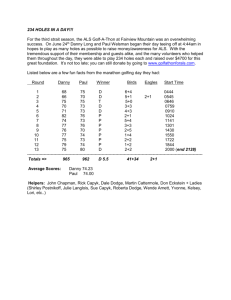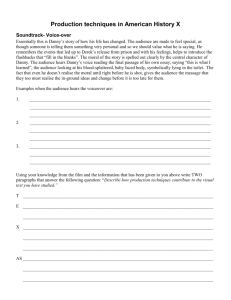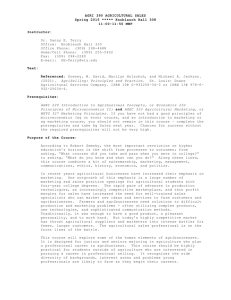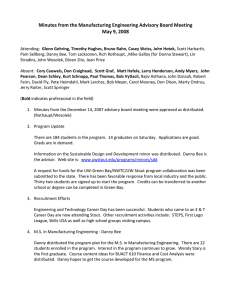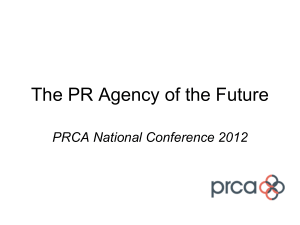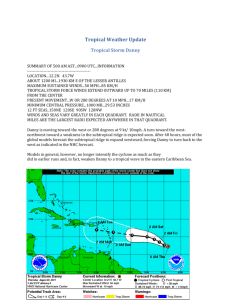AGRI 390 AGRICULTURAL SALES Instructor: Dr. Danny E. Terry
advertisement
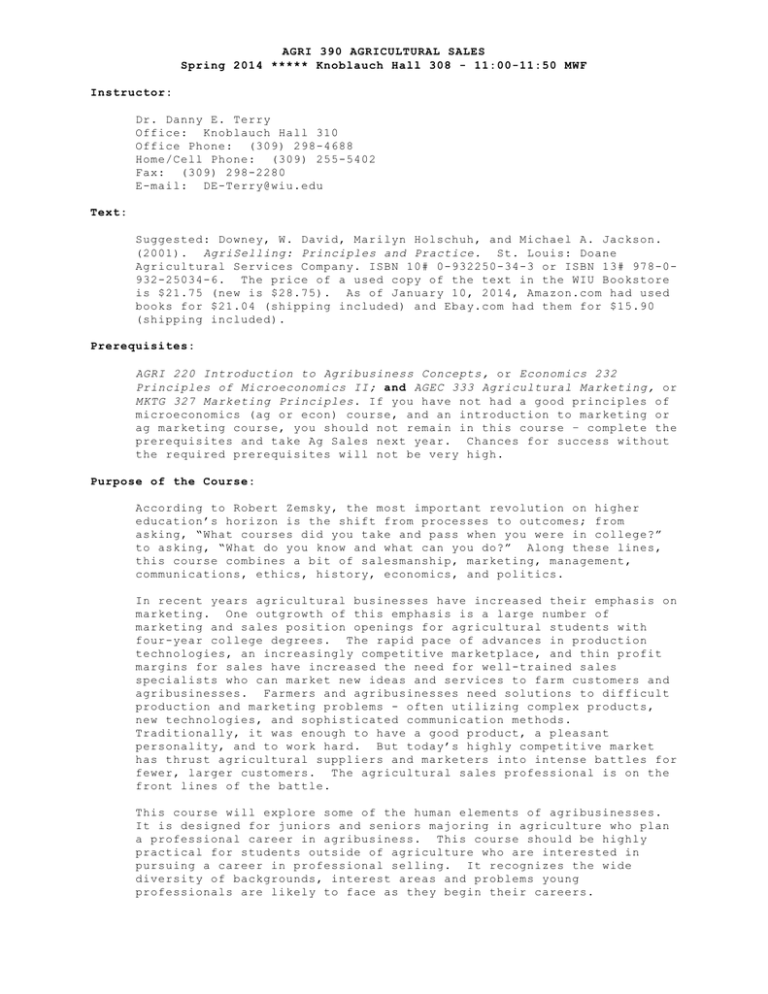
AGRI 390 AGRICULTURAL SALES
Spring 2014 ***** Knoblauch Hall 308 - 11:00-11:50 MWF
Instructor:
Dr. Danny E. Terry
Office: Knoblauch Hall 310
Office Phone: (309) 298-4688
Home/Cell Phone: (309) 255-5402
Fax: (309) 298-2280
E-mail: DE-Terry@wiu.edu
Text:
Suggested: Downey, W. David, Marilyn Holschuh, and Michael A. Jackson.
(2001). AgriSelling: Principles and Practice. St. Louis: Doane
Agricultural Services Company. ISBN 10# 0-932250-34-3 or ISBN 13# 978-0932-25034-6. The price of a used copy of the text in the WIU Bookstore
is $21.75 (new is $28.75). As of January 10, 2014, Amazon.com had used
books for $21.04 (shipping included) and Ebay.com had them for $15.90
(shipping included).
Prerequisites:
AGRI 220 Introduction to Agribusiness Concepts, or Economics 232
Principles of Microeconomics II; and AGEC 333 Agricultural Marketing, or
MKTG 327 Marketing Principles. If you have not had a good principles of
microeconomics (ag or econ) course, and an introduction to marketing or
ag marketing course, you should not remain in this course – complete the
prerequisites and take Ag Sales next year. Chances for success without
the required prerequisites will not be very high.
Purpose of the Course:
According to Robert Zemsky, the most important revolution on higher
education’s horizon is the shift from processes to outcomes; from
asking, “What courses did you take and pass when you were in college?”
to asking, “What do you know and what can you do?” Along these lines,
this course combines a bit of salesmanship, marketing, management,
communications, ethics, history, economics, and politics.
In recent years agricultural businesses have increased their emphasis on
marketing. One outgrowth of this emphasis is a large number of
marketing and sales position openings for agricultural students with
four-year college degrees. The rapid pace of advances in production
technologies, an increasingly competitive marketplace, and thin profit
margins for sales have increased the need for well-trained sales
specialists who can market new ideas and services to farm customers and
agribusinesses. Farmers and agribusinesses need solutions to difficult
production and marketing problems - often utilizing complex products,
new technologies, and sophisticated communication methods.
Traditionally, it was enough to have a good product, a pleasant
personality, and to work hard. But today’s highly competitive market
has thrust agricultural suppliers and marketers into intense battles for
fewer, larger customers. The agricultural sales professional is on the
front lines of the battle.
This course will explore some of the human elements of agribusinesses.
It is designed for juniors and seniors majoring in agriculture who plan
a professional career in agribusiness. This course should be highly
practical for students outside of agriculture who are interested in
pursuing a career in professional selling. It recognizes the wide
diversity of backgrounds, interest areas and problems young
professionals are likely to face as they begin their careers.
Upon completion of this course you will have successfully:
1. Become conversant in the language of sales and marketing.
2. Created a profile of the professional salesperson.
3. Developed goal setting and time management skills.
4. Explored the nature of farmer and agribusiness buying behavior in
purchasing inputs, and how this information can be used in selling
and marketing to farmers and agribusinesses.
5. Become familiar with the decision making process of buyers.
6. Explored the relationship between marketing and personal selling.
7. Explored the process of communication -- verbal, nonverbal,
questioning, and listening.
8. Learned first-hand about the opportunities and frustrations of a
career in selling by spending an entire day riding with a
salesperson.
9. Surveyed sales opportunities throughout the food and agribusiness
sector, including feed, animal health, agricultural chemicals, seed,
fertilizer, and machinery.
Basis for Student Evaluation:
The course grade will be based on the following factors, with weighted
values as indicated:
Day With A Salesperson (DWAS) Exercise ----------- 25%
Midterm exam ------------------------------------- 20%
Preparation and Class Sales Presentation --------- 15%
Report on Class Sales Presentation --------------- 5%
Sales Presentation to a Sales Professional ------- 5%
Final Exam (Comprehensive)------------------------ 30%
Total----------100%
Your grade will be based on the DWAS experience, presentations, reports,
and exams. The final grading scale is based on the percentages shown
below:
A = 100-93
A- = 92-90
B+ = 89-87
B = 86-83
B- = 82-80
C+ = 79-77
C = 76-73
C- = 72-70
D+ = 69-67
D = 66-63
D- = 62-60
F = 59-0
There will be no "extra credit" assignments; however grades may be
curved upward at the end of the semester.
Day With A Salesperson Exercise: Through this exercise, you will
directly observe a professional at work. You will learn more about what
a salesperson actually does during a typical day. You’ll find out first
hand what it’s like to be a salesperson, so that you can make a more
informed career choice -- after all, sales is not for everyone! You
will observe how a salesperson in your area of professional interest
actually works with customers -- it should help you to be a better
buyer! You’ll learn how the concepts and techniques that you study in
class are applied by professionals in the field. You will learn how to
handle yourself as a professional in a professional environment. You’ll
arrange for your observation day, complete it, and write a report that
will provide you with an opportunity to sharpen your communication
skills (Writing Center is in Malpass Library on the Third Floor - West
Side -- 298-2815), as well as to get a taste of the “real world.”
You’ll make contacts in your area of professional interest. A summer
job, interview, or even a career might develop from your day with a
salesperson. You never know when you might need such a contact. You’ll
receive more information on this project early in the course. You will
not receive a passing final grade until this project is successfully
completed.
Midterm Exam: The essay (primarily) exam will be over lectures,
presentations, handouts, videos, guest speakers, and class discussions.
The writing component will be evaluated along with content. The midterm
exam will not be given early - so please don’t ask.
Sales Preparation and Classroom Sales Presentation: You will be asked
to develop a sales plan and presentation for an agricultural product of
your choosing (with approval from Danny) and present your sales plan to
a combination of peers. This will be a “real life” professional sales
presentation (not a typical class presentation). You’ll receive more
information on this project as the course proceeds.
Report on Classroom Sales Presentation: This 2-4 page (double-spaced)
report will be a summary of your professional sales plan and
presentation -- what would you change from the preparation activities,
what went well with your presentation, what went poorly, how you would
handle objections in the future, etc. This should be relatively easy to
write. Your paper must be well organized, following good essay format
and use of the English language. The paper must be grammatically
correct. Use a 12-point Times Roman or Letter Gothic print-type and
one-inch margins on all sides. The 2-4 page requirement relates only to
the text -- title page and other attachments are not included in the 2-4
page requirement. The report is due 2 class periods after your
classroom presentation. Late reports will be downgraded 25% per
weekday.
Sales Presentation to a Sales Professional: On Thursday, April 24 at
6:00 PM, you will have dinner (Danny’s paying for the meals) with a
group of professional salespeople in Knoblauch Hall 239. Please dress
professionally (as if you were interviewing for a sales job with a major
agricultural corporation)!!! After the meal, you will give your sales
presentation to one of the sales professionals – as if it were a real
life sales call. You will not receive a passing final grade until this
presentation is successfully completed.
Final Exam: The essay (primarily) exam will be comprehensive over
lectures, presentations, handouts, videos, guest speakers and class
discussions. The writing component will also be evaluated. The final
exam will not be given early - so please don’t ask.
Score Revisions: Occasionally a scoring mistake will be made -professors are human, too. If you feel that you deserve more credit
than you received, see Danny after class in his office. Come with a
"perfect" answer in mind and he'll compare that to what you have
written. If the score is too low, it will be raised immediately. Also
Danny would be deeply impressed with the integrity of students who come
to him to report that he made an addition error and/or gave too much
credit.
Expectations of Students:
Attendance and Participation: A few things to avoid in any college
classes are: 1) carrying on personal conversations with others during
lectures; 2) sending text messages or surfing the web on your cell
phones during class; 3) allowing your cell phone to ring during class;
4) missing class and asking “Did I miss anything important?”; 5) placing
your head on your desk or falling asleep during the lecture/class; 6)
being excessively tardy; 7) failing to read assigned textbook or
collateral material; 8) being absent on exam days; and 9) not bringing
required materials to class.
Thus, specifically for AGRI 390 (and many other courses), regular
attendance (and timely arrival) is expected (just like showing up for
work - and showing up on time is required if you want to keep your job).
Notify Danny if you are going to be absent. Each person in the
classroom is expected to treat everyone else as members of a scholarly
community – provide useful critique and refrain from destructive or
harassing commentary. Be professional. Turn off and put away your
laptop computer, iPhone, iPad, Blackberry, Android, etc. when you arrive
(you will not need them for this course). DO NOT send text messages,
check email, or browse the web during class – put your phone away and
leave it there! If you need an exception to the computer and phone
policy due to medical or safety reasons, you should discuss this with
Danny BEFORE class begins that day. Keep your arguments civil –
classroom disruption will be seen as a disciplinary offense. These
types of behaviors (as listed above) during class will lead to automatic
dismissal for the day. Two dismissals due to disruptive or
unprofessional behavior will result in a permanent disbarment from the
course and a final grade of “F” will be assigned – you may appeal this
decision to the Council on Admission, Graduation and Academic Standards.
Academic Integrity: It is felt that you are well aware of what actions
violate the standards of academic honesty which have been established at
this University. If you are not aware of what constitutes an academic
violation, or not aware of regulations/policies, please refer to
www.wiu.edu/policies/acintegrity.php on WIU’s webpage. It would be
unfair to violators and to other students for Danny not to follow
through with the disciplinary process which has been established when he
is certain a violation has occurred. If caught cheating on an exam or
plagiarizing others' work, Danny will follow-up with a written report to
you explaining the situation as he views it, and the evidence he has
pertaining to the event. After meeting with you, if Danny is still
convinced that you were cheating (this includes plagiarism), you will be
assigned a final grade of "F" for this course. A full disclosure of
student rights and responsibilities can be found at
www.wiu.edu/policies/acintegrity.php on WIU’s webpage.
Seating Chart:
To help Danny to get to know you personally, you are asked to establish
a regular seat on the third class period. Danny will put your names on
a seating chart so that he might better and more quickly put names with
faces.
Teaching Philosophy of Danny Terry:
The test of a good teacher is not how many questions
he can ask his students that they will answer readily,
but how many questions he inspires them to ask him
which he finds it hard to answer.
Alice Wellington Rollins
Danny Terry believes that a university system is comprised of a
leadership team made up of a president, provost, vice presidents,
college deans, chairpersons, faculty, and staff who are responsible for
the coordinated effort of teaching/learning directed to the most
important members of the university system -- the students.
Danny's individual teaching style can best be described as open,
informal, and one of active participation. As a teacher, his primary
objective is to assist (not spoon feed) students in learning and ensure
their abilities so they can achieve their goals. He views himself as a
facilitator of learning. Danny tries not to emphasize memorization
beyond what is necessary, but does try to provide leadership and
encourage scholarship, knowledge, problem-solving, and application.
Oftentimes the cause and effect flow in teaching/learning is reversed;
often Danny learns from his students. He encourages them to ask "the
difficult questions" of him and those around them. It is his policy to
explain to the students that he makes mistakes -- Danny is as imperfect
as the next person. Danny regularly asks for guidance and suggestions
to improve his teaching skills, but more importantly to improve
students' ability to understand, learn, communicate, and apply. He
strives for a relaxed classroom atmosphere where students can at any
time ask questions or provide additional relevant comments.
Danny feels that teachers must take personal and moral responsibilities
for improving the intellectual environment, developing a global
perspective in all facets, encourage strong leadership and support by
challenging that leadership through appropriate means, and focus on
presenting academic programs in a manner that is more interdisciplinary,
inter-generational, inter-cultural, and international. Danny also feels
that students must be prepared and willing to actively participate in
such an environment.
Office Hours:
You are encouraged to visit Danny in his office. An appointment is not
necessary if you plan to visit during Danny's office hours, but a call
may save you some time. To make your visit more productive, plan to
bring a list of specific questions or troublesome topics. If you have a
specific question, you may call Danny at his office. You may also call
him at his home in the evening, but only before 10:00 p.m. If it is an
absolute emergency, the time restriction is waived (remember -- your
definition of an absolute emergency and Danny's definition might be
different).
Agricultural Education Majors:
If you are majoring in Agricultural Education (or other education
major), you are required to receive a grade of "C" or better in this
course in order to meet State of Illinois certification requirements.
With the current university +/- grading system, receiving a "C-" or
below will require you to retake this course or find a substitute course
to meet School of Agriculture graduation requirements.
Americans with Disabilities Act (ADA):
At Western, accommodations in the area of test and note-taking may be
made for any student who notifies the instructor of the need for an
accommodation. It is imperative that you take the initiative to bring
such needs to the attention of your instructors, as they are legally not
permitted to inquire about such particular needs of students. For AGRI
390 Agricultural Sales, if you need special accommodations, please feel
free to come and discuss this with Danny, or contact Tara Buchannan
(298-2512) at Disability Resource Center -- Memorial Hall 143.
Food, Beverage, and Tobacco Policy:
The use of tobacco is prohibited in Knoblauch Hall.
Course Outline:
Below is the tentative schedule for AGRI 390 Agricultural Sales.
with any plan, one must be flexible.
January 13
January 15
January 17
January 20
January 22
January 25
January 27
January 29
January 31
February 3
February 5
February 7
February 10
February 12
February 14
February 17
February 19
February 21
February 24
February 26
February 28
(M)
(W)
(F)
(M)
(W)
(F)
(M)
(W)
(F)
(M)
(W)
(F)
(M)
(W)
(F)
(M)
(W)
(F)
(M)
(W)
(F)
–
-
March
March
March
March
March
3
5
7
17
19
(M)
(W)
(F)
(M)
(W)
-
March
March
March
March
March
April
April
21
24
26
28
31
2
4
(F)
(M)
(W)
(F)
(M)
(W)
(F)
-
April
April
April
April
April
April
April
7
9
11
14
16
18
21
(M)
(W)
(F)
(M)
(W)
(F)
(M)
-
April 23
(W) -
April 24
(TR)-
April 25
April 28
April 30
May 2
May 7
(F)
(M)
(W)
(F)
(W)
-
As
Introduction to the course
Day With A Sales Person (DWAS) Introduction
Chapter 1: What is Agri Selling?
Martin Luther King Day (no class)
Chapter 2: The Sales Profession
Chapter 2: The Sales Profession
Appendix A: Code of Ethics
Chapter 3: Rewards of an Agricultural Selling Career
Chapter 3: Rewards of an Agricultural Selling Career
Appendix B: Working at Farm/Trade Shows
Chapter 4: Why People Buy
Chapter 4: Why People Buy
Ready-Set-Sell – [Assignment #1 {Salesperson} Due]
Abraham Lincoln Day (no class)
DWAS (no class)
Chapter 5: How People Buy
Chapter 6: Customers Buy Value
Chapter 6: Customers Buy Value
Presentation Examples
Chapter 7: The Market System
Chapter 7: The Market System – [Assignment #2 {Report
A} Due]
Exam #1 (Chapters 1-7)
Chapter 9: Prospecting
DWAS (no class)
Chapter 9: Prospecting
Chapter 11: Opening the Call to Build a Customer
Relationship – [Assignment #3 {Report B} Due]
Chapter 12: Identify Customer Needs and Values
Chapter 13: Presenting Your value
Chapter 14: Dealing with Resistance
Appendix C: Handling Customer Complaints/Conflicts
Chapter 15: Closing the Sale
Chapter 15: Closing the Sale
Presentations – [Assignment #4 {Report
C} Due]
Presentations
Presentations
Presentations
Presentations
Presentations
Presentations
Presentations – [Assignment #5 {Final DWAS
Report} Due]
Preparation for Evening Dinner and Sales Call
Presentations with Professionals
Dinner at 6:00 PM in Knoblauch Hall 239 and
Presentations to Professionals
Appendix D: Collecting Accounts
Chapter 16: Creating Customer Satisfaction
Chapter 16: Creating Customer Satisfaction
Course Review
Final Exam (Chapters 1-7, 9, 11-16) at 10:00 AM
Important Dates:
January 17 - Open registration ends
January 20 - Martin Luther King Day –- classes dismissed
January 27 - Last day to process a drop without being assessed tuition
or receiving a “W” grade; a full refund will be made of all tuition and
mandatory fees for any student totally withdrawing from the University
February 12 - Lincoln’s Birthday –- classes dismissed
March 10-14 - Spring break –- classes dismissed
March 30 - Last day to make a total university withdraw
March 30 - Last day to drop a 16-week class
April 1-18 - Advance registration for Summer 2014 and Fall 2014
May 5-9 - Final exam week (AGRI 390 -- Wednesday, May 7 @ 10:00 AM)
OFFICE HOURS AND CLASS SCHEDULE
Spring 2014 Semester
Name: Danny E. Terry
M onday
7:00 -- 7:30
7:30 -- 8:00
8:00 -- 8:30
8:30 -- 9:00
9:00 -- 9:30
9:30 - 10:00
10:00 - 10:30
10:30 - 11:00
11:00 - 11:30
11:30 - 12:00
12:00 - 12:30
12:30 -- 1:00
1:00 -- 1:30
1:30 -- 2:00
2:00 -- 2:30
2:30 -- 3:00
3:00 -- 3:30
3:30 -- 4:00
4:00 -- 4:30
4:30 -- 5:00
5:00 -- 5:30
5:30 -- 6:00
Evening
Office Hours
Office Hours
Prepare for Classes
Prepare for Classes
390 Agri Sales
390 Agri Sales
MDH
MDH
MDH
MDH
MDH
MDH
MDH
MDH
Volunteer
Volunteer
Volunteer
Volunteer
Volunteer
Volunteer
Volunteer
Volunteer
Office Phone: 309.298.4688
Tuesday
Prepare for Classes
Prepare for Classes
430 Environmental Ec
430 Environmental Ec
430 Environmental Ec
Office Hours
Office Hours
Prepare for Classes
Prepare for Classes
100 Growth/W ell Being
100 Growth/W ell Being
Wednesday
Office Hours
Office Hours
Prepare for Classes
Prepare for Classes
390 Agri Sales
390 Agri Sales
Cell Phone: 309.255.5402
Thursday
Prepare for Classes
Prepare for Classes
430 Environmental Ec
430 Environmental Ec
430 Environmental Ec
Office Hours
Office Hours
Friday
Prepare for
Prepare for
390 Agri
390 Agri
Classes
Classes
Sales
Sales
